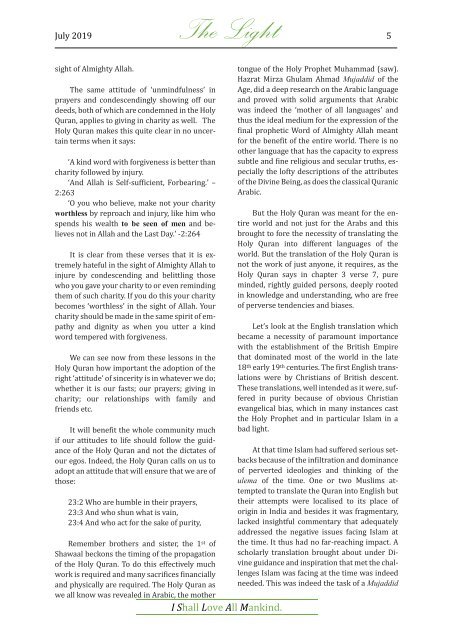The Light July 2019 07
Monthly magazine of the Lahore Ahmadiyya Movement. Presenting Islam as taught by the Holy Prophet Muhammad (s) - loving, peaceful, inclusive, rational, teaching Muslims to respect the followers and founders of all religions.
Monthly magazine of the Lahore Ahmadiyya Movement. Presenting Islam as taught by the Holy Prophet Muhammad (s) - loving, peaceful, inclusive, rational, teaching Muslims to respect the followers and founders of all religions.
You also want an ePaper? Increase the reach of your titles
YUMPU automatically turns print PDFs into web optimized ePapers that Google loves.
<strong>July</strong> <strong>2019</strong> <strong>The</strong><br />
<strong>Light</strong> 5<br />
sight of Almighty Allah.<br />
<strong>The</strong> same attitude of ‘unmindfulness’ in<br />
prayers and condescendingly showing off our<br />
deeds, both of which are condemned in the Holy<br />
Quran, applies to giving in charity as well. <strong>The</strong><br />
Holy Quran makes this quite clear in no uncertain<br />
terms when it says:<br />
‘A kind word with forgiveness is better than<br />
charity followed by injury.<br />
‘And Allah is Self-sufficient, Forbearing.’ –<br />
2:263<br />
‘O you who believe, make not your charity<br />
worthless by reproach and injury, like him who<br />
spends his wealth to be seen of men and believes<br />
not in Allah and the Last Day.’ -2:264<br />
It is clear from these verses that it is extremely<br />
hateful in the sight of Almighty Allah to<br />
injure by condescending and belittling those<br />
who you gave your charity to or even reminding<br />
them of such charity. If you do this your charity<br />
becomes ‘worthless’ in the sight of Allah. Your<br />
charity should be made in the same spirit of empathy<br />
and dignity as when you utter a kind<br />
word tempered with forgiveness.<br />
We can see now from these lessons in the<br />
Holy Quran how important the adoption of the<br />
right ‘attitude’ of sincerity is in whatever we do;<br />
whether it is our fasts; our prayers; giving in<br />
charity; our relationships with family and<br />
friends etc.<br />
It will benefit the whole community much<br />
if our attitudes to life should follow the guidance<br />
of the Holy Quran and not the dictates of<br />
our egos. Indeed, the Holy Quran calls on us to<br />
adopt an attitude that will ensure that we are of<br />
those:<br />
23:2 Who are humble in their prayers,<br />
23:3 And who shun what is vain,<br />
23:4 And who act for the sake of purity,<br />
Remember brothers and sister, the 1 st of<br />
Shawaal beckons the timing of the propagation<br />
of the Holy Quran. To do this effectively much<br />
work is required and many sacrifices financially<br />
and physically are required. <strong>The</strong> Holy Quran as<br />
we all know was revealed in Arabic, the mother<br />
I Shall Love All Mankind.<br />
tongue of the Holy Prophet Muhammad (saw).<br />
Hazrat Mirza Ghulam Ahmad Mujaddid of the<br />
Age, did a deep research on the Arabic language<br />
and proved with solid arguments that Arabic<br />
was indeed the ‘mother of all languages’ and<br />
thus the ideal medium for the expression of the<br />
final prophetic Word of Almighty Allah meant<br />
for the benefit of the entire world. <strong>The</strong>re is no<br />
other language that has the capacity to express<br />
subtle and fine religious and secular truths, especially<br />
the lofty descriptions of the attributes<br />
of the Divine Being, as does the classical Quranic<br />
Arabic.<br />
But the Holy Quran was meant for the entire<br />
world and not just for the Arabs and this<br />
brought to fore the necessity of translating the<br />
Holy Quran into different languages of the<br />
world. But the translation of the Holy Quran is<br />
not the work of just anyone, it requires, as the<br />
Holy Quran says in chapter 3 verse 7, pure<br />
minded, rightly guided persons, deeply rooted<br />
in knowledge and understanding, who are free<br />
of perverse tendencies and biases.<br />
Let’s look at the English translation which<br />
became a necessity of paramount importance<br />
with the establishment of the British Empire<br />
that dominated most of the world in the late<br />
18 th early 19 th centuries. <strong>The</strong> first English translations<br />
were by Christians of British descent.<br />
<strong>The</strong>se translations, well intended as it were, suffered<br />
in purity because of obvious Christian<br />
evangelical bias, which in many instances cast<br />
the Holy Prophet and in particular Islam in a<br />
bad light.<br />
At that time Islam had suffered serious setbacks<br />
because of the infiltration and dominance<br />
of perverted ideologies and thinking of the<br />
ulema of the time. One or two Muslims attempted<br />
to translate the Quran into English but<br />
their attempts were localised to its place of<br />
origin in India and besides it was fragmentary,<br />
lacked insightful commentary that adequately<br />
addressed the negative issues facing Islam at<br />
the time. It thus had no far-reaching impact. A<br />
scholarly translation brought about under Divine<br />
guidance and inspiration that met the challenges<br />
Islam was facing at the time was indeed<br />
needed. This was indeed the task of a Mujaddid














